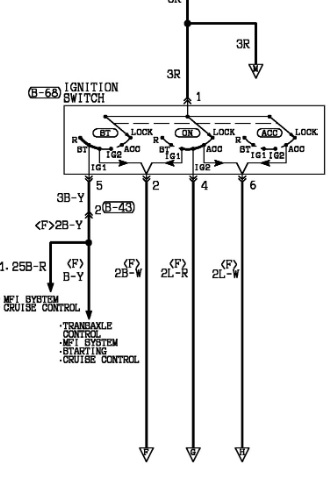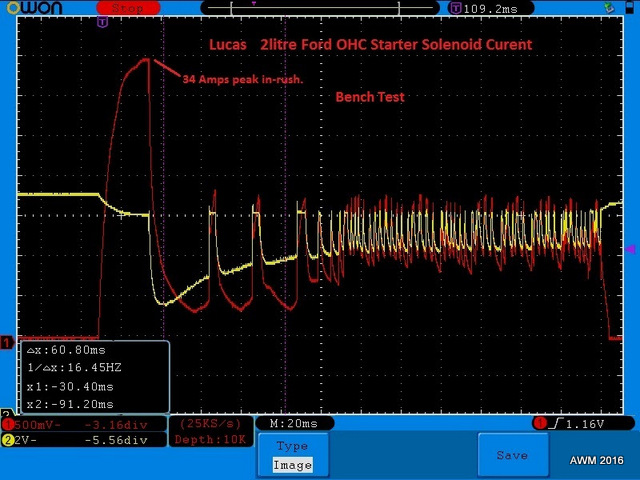[SOLVED] 2003 Mitsu Diamante Ignition fuse blowing
- RobBrown
-
Topic Author
- Offline
- Junior Member
-

- Glad to be here!
- Posts: 34
- Thank you received: 26
2003 Mitsubishi Diamante...150K or so. Customer states it was driving fine. Then died suddenly and wouldn't restart...no crank. Found 30A fusible link blown. This fuse sits just before the ignition switch. Put new fuse in and it stayed until ignition turned to start position. A few clicks from the starter, fuse blew. I unplugged the ignition switch, and using a power probe, provided 12v to each of the outputs from the switch. Lots of activity on each output, including the starter actually cranking the engine (no start, though). Internal fuse on the power probe never blew. So I put my low current amp probe around the power probe wire and did the same thing again. At the wire going to the starter (and other things) I saw an intitial spike (very brief) of 25A, and then it settled back down to between 3 and 5. Doing the same thing at the wire that feeds the ignition and fuel delivery system, I saw an initial spike of 17A and then back down to 2.5-3A. Clearly, if both those spikes are occurring at the same time, that's enough amperage to blow the 30A ignition fuse.
My question is, what are likely candidates for causing these momentary current spikes. Clearly this isn't a simple constant short to ground. Any ideas? The wire with the 17A intitial spike is feeding the distributor assembly and the fuel pump. Those are two prime suspects for me, though I don't feel comfortable enough with the process to understand why they'd spike quickly and drop down to manageable levels. Additionally, the starter wire that's drawing an initial 25A seems excessive...not leaving much overhead. Could the problem be in that direction?
As I understand the wiring diagram, both the wire going to the ignition/fuel system and the wire going to the starter are powered simultaneously when the key is in the START position. Minus the spikes, the amperage is manageable. What's causing these spikes? And how do I determine the answer to that question?
Any help appreciated!
Thanks,
Rob
Please Log in or Create an account to join the conversation.
- 1mouse3
-

- Offline
- Senior Member
-

- Posts: 69
- Thank you received: 4
Please Log in or Create an account to join the conversation.
- Inge Jeppesen
-

- Offline
- Junior Member
-

- Ford master tech.
- Posts: 38
- Thank you received: 3
To me 25 amps draw by the starter solenoid seems a bit much.
Please Log in or Create an account to join the conversation.
- Tyler
-

- Offline
- Moderator
-

- Full time HACK since 2012
- Posts: 6063
- Thank you received: 1531
No offense meant here, but I think it's interesting that the short went away when you disconnected the ignition switch and started testing. Any chance that the blue/yellow wire was rubbing ground somewhere on the column beforehand?
EDIT: Diagram incoming
Please Log in or Create an account to join the conversation.
- Andy.MacFadyen
-

- Offline
- Moderator
-

- Posts: 3353
- Thank you received: 1037
The same goes for the fuel pump, spike at key on then fall back as soon as the pump motor starts to run --- but the spikes would not normall overlap ie. first the pump spike then stater solenoid spike..
" We're trying to plug a hole in the universe, what are you doing ?. "
(Walter Bishop Fringe TV show)
Please Log in or Create an account to join the conversation.
- Andy.MacFadyen
-

- Offline
- Moderator
-

- Posts: 3353
- Thank you received: 1037
" We're trying to plug a hole in the universe, what are you doing ?. "
(Walter Bishop Fringe TV show)
Please Log in or Create an account to join the conversation.
- RobBrown
-
Topic Author
- Offline
- Junior Member
-

- Glad to be here!
- Posts: 34
- Thank you received: 26
Am I correct, then, to assume that the short is likely occuring, as Tyler suggests, somewhere near the harness connector at the ignition switch OR is it possible that there could be a short INTERNAL to the ignition switch itself?
Is my diagnostic technique here sound? Primarily, that if powering each of the output wires with a powerprobe and watching that amperage never jumps to an crazy level on any of them clears any of those circuits as potentials?
Thanks,
Rob
Please Log in or Create an account to join the conversation.
- 1mouse3
-

- Offline
- Senior Member
-

- Posts: 69
- Thank you received: 4
Please Log in or Create an account to join the conversation.
- RobBrown
-
Topic Author
- Offline
- Junior Member
-

- Glad to be here!
- Posts: 34
- Thank you received: 26
Do you mean remove the fuse and check the non-powered ground pin in the fuse box to verify that it is grounded?
Thanks,
Rob
Please Log in or Create an account to join the conversation.
- 1mouse3
-

- Offline
- Senior Member
-

- Posts: 69
- Thank you received: 4
Please Log in or Create an account to join the conversation.
- Tyler
-

- Offline
- Moderator
-

- Full time HACK since 2012
- Posts: 6063
- Thank you received: 1531
RobBrown wrote: Than ks for all your input, folks! So what I'm gathering from the info provided by Tyler and Andy is that the amp spikes I'm seeing when powering each of those ignition switch outputs is likely NOT concerning and so it is likely that it isn't something in any of those circuits that's blowing the fuse.
Am I correct, then, to assume that the short is likely occuring, as Tyler suggests, somewhere near the harness connector at the ignition switch OR is it possible that there could be a short INTERNAL to the ignition switch itself?
Is my diagnostic technique here sound? Primarily, that if powering each of the output wires with a powerprobe and watching that amperage never jumps to an crazy level on any of them clears any of those circuits as potentials?
Thanks,
Rob
Personally, I'm not sure that the Power Probe test clears those circuits
One thing I can suggest doing is installing a 30A circuit breaker in place of the fusible link for testing purposes. This'll allow you to hook everything back up and check for shorts without swapping the link, AND can be coupled with a test light to let you know when the breaker is open.
Please Log in or Create an account to join the conversation.
- RobBrown
-
Topic Author
- Offline
- Junior Member
-

- Glad to be here!
- Posts: 34
- Thank you received: 26
Thank you so much for your feedback! I'm very happy to report that the issue here is solved.
I wired a 30 amp circuit breaker in to the underhood fuse box in place of the 30 amp fuse so I could do more un-interrupted testing. Upon so doing, my first attempt to start the car....worked! First time the engine had run in 3 months!
At that point, however, I had no reason as to why, which was unsettling. All I'd done (I thought:-) was to unplug the ignition switch and plug it back in. I wondered, like Tyler had wondered early on, if maybe there was a short in that wiring that I'd moved and now missed. So I pushed and pulled on that connector and all its associated wiring attempting to get the car to stall out...but to no avail. Shut off the car and restarted it several times...everything was working fine. So I told the guy to drive it around, close to home, for awhile, assuming that at some point, that circuit breaker would break again, and that I'd get with him at that point and continue to troubleshoot the intermittent fault. Needless to say, that didn't feel so good.
HOWEVER!!!! As I was buttoning things back up under the steering wheel, I plugged in a switch that had been installed aftermarket as a means by which to turn the blower motor full on or full off...apparently the wiring to that unit had been trashed when the guy bought the car. After plugging that switch back in, I attempted to restart the car and...nothing...circuit breaker tripped! I nearly cheered out loud:-) Some further testing revealed that the wiring for that switch included a wire that had been run to the body of the car...a ground for the little LED indicator light on the switch. There was a short happening internal to the switch that, when in the on position, was sending the power directly to that ground wire and blowing the 30 amp fuse.
The customer quickly made the determination that having an LED indicator light wasn't worth the hassle of a dead car...so we removed the ground wire and tested.
Man....that felt so good. And it's why I love this work. This dude's car had been sitting for 3 months...and he had no means whatsoever to have it taken someplace for diagnostics. He was intensely thankful to me...and I pass that thanks on to you all...and especially to Paul...for your commitment to make freely available, high quality, engaging, thoughtful instructional mater. At this point, it's made it possible for a guy with very little money to gain back the freedom of a working automobile. And I know he's not the only one who's benefited.
Many thanks!
Rob
Please Log in or Create an account to join the conversation.
- RobBrown
-
Topic Author
- Offline
- Junior Member
-

- Glad to be here!
- Posts: 34
- Thank you received: 26
1. It seems like the Power Probe test (sending 12 v to each of the outputs of the ignition switch while measuring current draw with an inductive amp probe on the PP wire) was a good test, in theory. None of those outputs, when powered, blew the internal circuit breaker of the PP, nor showed excessive amp draw on the scope. However, the reason none of these outputs, when powered, blew the breaker, was because the offender (the aftermarket switch) was unplugged. That switch had to be unplugged in order for me to remove the under-steering-wheel panel to get at the ignition switch. Had it been plugged in, one of those outputs definitely would have blown the breaker and the test would have cleared several of those main output circuits.
2. As was discussed here early on, it seems like we have further proof that those very momentary, high amp spikes on various outputs were NOT the offenders and were, as Tyler and others theorized, normal...and far too brief to heat up and blow a fuse.
3. Why didn't this shorted switch blow a smaller fuse, and why did it take down the whole car? Because the guy who wired it in wired it to the powered side of a fuse in the interior fuse box...so the only fuse that stood between it and the battery was the 30amp underhood ignition fuse. Seems silly in hindsight...definitely should have wired a smaller fuse into that circuit...or better yet, actually fixed the blower motor wiring:-)
Please Log in or Create an account to join the conversation.
- Noah
-

- Offline
- Moderator
-

- Give code definitions with numbers!
- Posts: 4957
- Thank you received: 1111
"Ground cannot be checked with a 10mm socket"
Please Log in or Create an account to join the conversation.
- Tyler
-

- Offline
- Moderator
-

- Full time HACK since 2012
- Posts: 6063
- Thank you received: 1531
Glad to hear the circuit breaker thing worked out. That's something I've only started doing recently, but it's a huge time saver in some cases. I started harvesting breakers wherever possible to expand the collection
I'm with ya on your conclusions, too. The PowerProbe test is definitely something to keep in mind for the future - maybe it didn't work out exactly as planned this time, but still useful. I wonder if the LED itself was shorted? Thinking of an shorted A/C compressor clutch clamping diode.
Man....that felt so good. And it's why I love this work. This dude's car had been sitting for 3 months...and he had no means whatsoever to have it taken someplace for diagnostics. He was intensely thankful to me...and I pass that thanks on to you all...and especially to Paul...for your commitment to make freely available, high quality, engaging, thoughtful instructional mater. At this point, it's made it possible for a guy with very little money to gain back the freedom of a working automobile. And I know he's not the only one who's benefited.
I know I learned something! And you should be proud of this one, sir. Short to ground testing is not easy, made worse when someone has been monkeying with the wiring before you
Please Log in or Create an account to join the conversation.
- Andy.MacFadyen
-

- Offline
- Moderator
-

- Posts: 3353
- Thank you received: 1037
Non-standard wiring argh!!!!!!
" We're trying to plug a hole in the universe, what are you doing ?. "
(Walter Bishop Fringe TV show)
Please Log in or Create an account to join the conversation.
- matt.white
-
- Offline
- Elite Member
-

- Posts: 220
- Thank you received: 29
And to defend myself before I get attacked, I've never used them on computer issues. But things like lights or operating power windows etc. I love it.
Oh and good find on the fault. Always very satisfying.
Please Log in or Create an account to join the conversation.
- RobBrown
-
Topic Author
- Offline
- Junior Member
-

- Glad to be here!
- Posts: 34
- Thank you received: 26
I have the PowerProbe 3. No amp draw readings...just used an inductive low amp probe displaying on an old school Vantage clamped around the main PP wire while powering the various IGN switch outputs at the unplugged connector terminals.
Rob
Please Log in or Create an account to join the conversation.
- Tyler
-

- Offline
- Moderator
-

- Full time HACK since 2012
- Posts: 6063
- Thank you received: 1531
matt.white wrote: And to defend myself before I get attacked, I've never used them on computer issues. But things like lights or operating power windows etc. I love it.
No hate from me! I think about getting a PowerProbe IV all the time.
Please Log in or Create an account to join the conversation.
- matt.white
-
- Offline
- Elite Member
-

- Posts: 220
- Thank you received: 29
They are good Tyler. Just in certain places I feel the need to defend myself sometimes. Should have remembered where I was.
Please Log in or Create an account to join the conversation.



